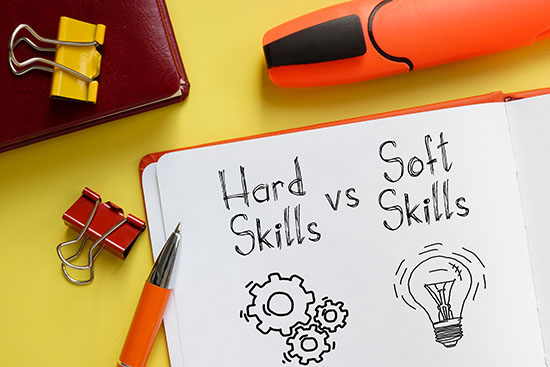The Difference Between Hard Skills and Soft Skills
There are two types of skills that we need to work on to be successful, hard and soft skills.
Hard skills are skills that are needed to perform a particular job or role. They are developed through education and proper training and are almost always mandatory to succeed in your chosen career path.
Examples of hard skills include data analysis skills (e.g., financial analysis), technical skills like coding, and analytical skills such as process management.
Soft skills are transferrable skills, strengths, and abilities that can serve different jobs and roles. They are useful for working with others and life.
Examples of soft skills include communication, empathy, and leadership, time management, and critical thinking.
The discussion of hard and soft skills typically comes up in job interviews whereby the right candidate is expected to have both the practical skills and desirable soft skills. It is therefore essential for people to have soft and hard skills for better success at work and in life.
However, are there any difference between the two skills? Keep reading to find out the differences between these two categories of skill sets and get some tips for developing your skill set in both areas.
What Are the Differences Between Hard Skills and Soft Skills?
- One Can Be Measured While the Other Cannot!
Soft skills are skills that cannot really be measured and effectively quantified. However, hard skills are individuals’ abilities that can be measured and defined easily with a test of knowledge. For example, hard skills can be supported by your certifications and can be evaluated. If you have the hard skill of bookkeeping, you are expected to have certificates that show you possess good bookkeeping knowledge. This is measurable and important when given a role that requires this skill. Alternatively, it is difficult to measure the level of a soft skill like creativity or patience. No certification directly measures or confirms the amount of patience or empathy that an individual possesses.
- Soft Skills Are ‘Universal’ While Hard Skills Are Role-Specific
Soft skills have a universal ‘feel.’ They can be used in different jobs and roles. These skills are ‘transferrable.’ The same cannot be said for hard skills. Every job or position will demand its own set of complex skills. Therefore, the hard skills suitable for one job may not be practical for another role. For example, a person’s ability to work in a team can come in handy across various roles and industries. Whether you work as a doctor, teacher or manager, teamwork will always be a quality needed for successfully working with others. However, the hard skill required in an engineering profession may not prove valuable in an accounting profession. These two roles will demand different sets of hard skills.
- Hard Skills Can Be Learned More Easily Than Soft Skills.
These are the skills that you can acquire from learning institutions. You can also develop hard skills when getting trained before getting into a job. However, soft skills are harder to teach. For example, emotional intelligence is linked to a person’s personality and character. A person can have it or not, and it is a difficult skill to transfer to another. However, other soft skills such as patience and good time management can be learned through experience and practice.
How To Improve Your Hard Skills
- Set Goals to Learn a Skill
One of the best ways to stay on track in your career is by setting specific goals. This will allow you not only know where you are going, but also what has been accomplished and how much ground there remains before reaching completion.
- Get Certified
You can get certifications for every hard skill you wish to learn. This is a good way of boosting your expertise and knowledge in your area of specialization or even learning a new hard skill altogether. In addition, certification proves that you indeed possess enough knowledge on the hard skill.
- Practicing Them Regularly and Practically
Practice is the secret ingredient to improving any skill. Hard skills are no different. For example, if you want to improve your Google Analytics skills, it would be advisable to approach your marketing department to learn it from the experts in a real-life setting. This will be beneficial to you but also help you to hone your expertise on the practical application of Google Analytics.
How To Improve Your Soft Skills
There are several ways to improve the soft skill and behaviors that help you work more efficiently with other people. Enhancing soft skills will help you to build more productive relationships. The following are some of the best practices you can use to improve your soft skills:
- Take Feedback Positively and Act on It
From time to time, your managers and colleagues may share constructive criticism about you. This is essential information that can help you to work on your perceived ‘weak areas.’ For example, if they say that you are not a good team member, you can find ways to improve your relations and communication with your team members.
- Keenly Observe Those with Strong Soft Skills
Observation is one of the simplest and fastest ways to improve any skill. Spend time observing and paying enough attention to how friends, family or colleagues with strong, soft skills work with others. This will give you a lot of insight into what to do and what is generally expected from you.
- Develop Good Problem Solving and Communication Skills
These set of soft skills can be improved by doing these four things:
- Listen to the other person’s point of view.
- Summarize what you heard
- Offer a solution
- Ask if that is an acceptable solution.
Keep improving this process until you learn it.
Final Thoughts
Soft skills come in handy when you need to work with people, whether a customer or coworker. Hard skills are like computer programming languages that can help you do things more efficiently. Both are important to develop for the growth of your career and relationships.



